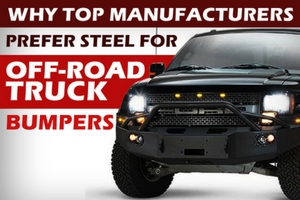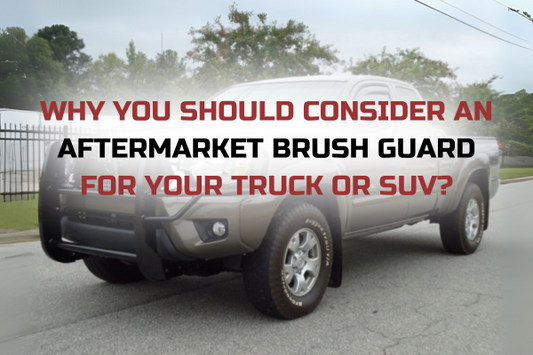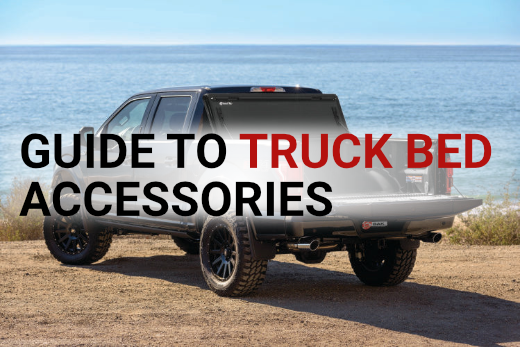Out of all the materials available, most custom bumpers for trucks are still made of good old-fashioned steel. There may be fancier alternatives out there such as aluminum, fiberglass or even carbon fiber but Steel Truck Bumpers are the top choice for the rigors of off-road use.
And it’s not just any type of steel. In particular, the carbon steel variant possesses properties that make it the most suitable for a bumper.
But what are those properties? Let’s take a deeper look into the type of steel used for off-road truck bumpers.
The Basics of Steel
Generally speaking, steel is a metal made of two elements: iron and carbon. It’s the carbon content present in the steel that determines many of its properties such as the hardness, strength,and ductility of the material. Its properties can be further modified when alloying materials such as chromium, molybdenum, nickel, manganese, or silicon are added.
Steel is considered to be “carbon steel” when it is composed of up to 2.1% carbon.This results in a steel with superior strength and durability. It is this type of steel that’s often used in the automotive industry. Carbon steel also accounts for 90% of steel production.
Its properties, availability, cost, and ease of working with the metal are part of the reason why bumper manufacturers prefer to use carbon steel.
What Different Manufacturers Use
Each manufacturer has their own preference when it comes to the type of steel used for their bumpers. While most of them use carbon steel, you’ll also find other metals used for specific applications.
We’ve selected four of the top manufacturers we stock to give you a quick look at the different kinds of metals they use.
Buckstop Truckware
This manufacturer makes use of three different metals: carbon steel, aluminum, and stainless steel. Buckstop bumpers use carbon steel as the primary material in their construction because of its strength and relatively low cost.
For cases where every pound matters, they also have aluminum bumpers available (we’ll compare steel to aluminum truck bumpers in a moment).
Lastly, stainless steel (made when chromium is added) is used to create bumpers with comparable strength to carbon steel, added corrosion-resistance, as well as an optional mirror finish. However, stainless steel comes at a premium cost.
Fab Fours
Coming from a company that specializes in off-road truck bumpers, a Fab Fours bumper uses carbon steel to meet its needs.
Using the latest 3D design software and equipment for metal forming and cutting, this manufacturer makes sure all that steel is put to good use. One look at their latest Dodge Ram off-road bumpers and you’ll see what we’re talking about.
Ranch Hand
Known for the heavy-duty style of their bumpers, Ranch Hand makes use of carbon steel materials as well.In addition, they also use diamond-plate steel plates and schedule 40 steel pipe in the construction of their bumpers.
As seen in their line of Ford off-road bumpers, this adds both style and practicality without compromising strength.
Hammerhead
The same high-quality steel found in mining trucks throughout the U.S. can be found in Hammerhead’s bumpers. They use A36 carbon steel that is brought to them in plate form. These plates are cleaned, cut, formed, machined, and welded into the excellent bumpers you’ve come to expect from Hammerhead.
Pros and Cons of Adding a Steel Bumper
As with any material, steel has both advantages and disadvantages. Here are the main points you should consider.
Pros
- Availability – When it comes to the options available in the market, steel bumpers far outnumber other alternatives. There are also various styles and sizes to choose from
- Strength – A bumper’s purpose is to take the hit to protect the vehicle and its occupants. Steel is the time-tested materials that can do just that.
- Easy to Work With – After a collision, damage to the bumper can be unavoidable. Other materials may need more extensive repair work but that’s not always the case with steel.
Cons
- Weight – This is the main complaint with steel bumpers. The material is inherently heavy, which means further modifications to your truck may be needed to accommodate the bumper.
- Corrosion – Rust is another concern. Though steps can be taken to help prevent corrosion, it’s still something to keep in mind. This is also why others look to rust-free alternatives such as stainless steel or aluminum.
Aluminum Bumpers: A Limited Alternative
If we consider only weight and resistance to corrosion, aluminum may seem like a worthwhile option. Compared to steel, it’s definitely lighter and you won’t have to worry about rust. In fact, there are quite a few aluminum truck bumpers available from various manufacturers.
However, what you save in weight and corrosion resistance will be paid for elsewhere. Quite literally, in this case.
Aluminum bumpers are more expensive than a comparable steel bumper. Its uses can also be limited since aluminum doesn’t stand up well to pulling forces. Although aluminum can stand up to impacts reasonably enough, it is more difficult to repair. This makes for another area where costs can add up.
We’re not saying that aluminum bumpers are bad but in most cases, a steel bumper will give you more options.
And when it comes to options, BumperOnly has plenty. Most of the bumpers in our collection are made of carbon steel – the top choice of the top manufacturers. Check out our store to find the perfect one for you.







